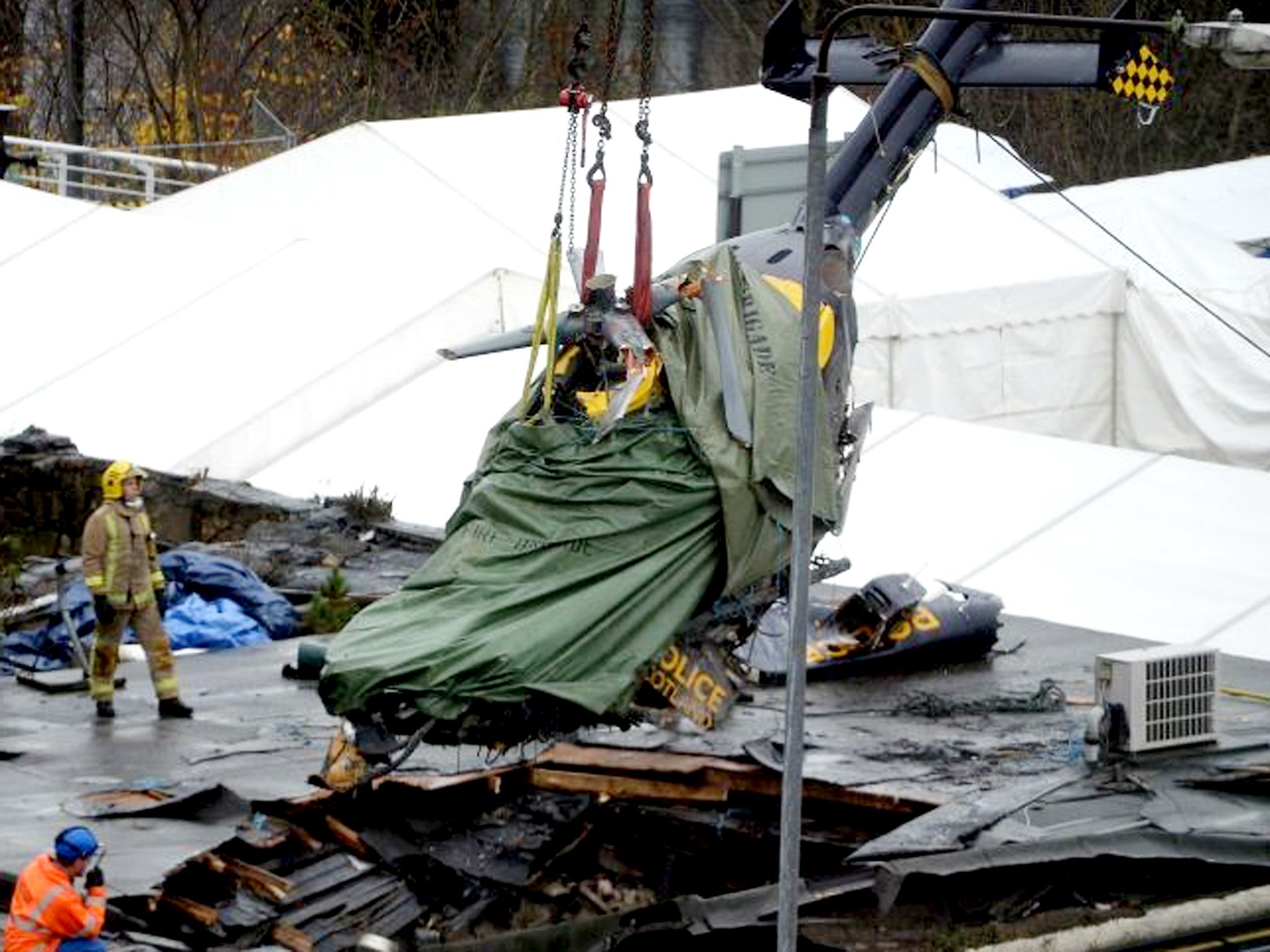Glasgow crash: helicopter maker issues alert over fuel gauge problem
Indication of fuel quantity in tanks could be over-estimated, says Eurocopter

Your support helps us to tell the story
From reproductive rights to climate change to Big Tech, The Independent is on the ground when the story is developing. Whether it's investigating the financials of Elon Musk's pro-Trump PAC or producing our latest documentary, 'The A Word', which shines a light on the American women fighting for reproductive rights, we know how important it is to parse out the facts from the messaging.
At such a critical moment in US history, we need reporters on the ground. Your donation allows us to keep sending journalists to speak to both sides of the story.
The Independent is trusted by Americans across the entire political spectrum. And unlike many other quality news outlets, we choose not to lock Americans out of our reporting and analysis with paywalls. We believe quality journalism should be available to everyone, paid for by those who can afford it.
Your support makes all the difference.Helicopter manufacturer Eurocopter has issued a worldwide safety alert after a fault was found in the model of craft that crashed into a busy Glasgow pub, killing 10 people.
The company said a problem had been discovered with the fuel indication system on some of its EC135 aircraft, the same type as the police helicopter involved in the Clutha bar tragedy on 29 November.
The warning comes after Operator Bond Air Services temporarily suspended flights of its 22 EC135 helicopters on Thursday when a fuel gauge fault was discovered on an air ambulance in the North West of England in a "precautionary measure."
The suspension affected air ambulance and police helicopters across the UK. However, many of these crafts have now resumed flights.
Eurocopter has now issued a safety information notice after tests revealed other aircraft may be affected by similar issues.
A statement said: "Eurocopter has been informed by Bond Air Services of an issue involving the fuel indication system experienced during normal operations by one of its EC135 EMS aircraft.
"Following this incident, fuel system functionality tests performed by Bond Air Services and two other EC135 operators in Europe have revealed possible similar supply-tank fuel gauging errors on some aircraft.
"This incident is currently under in-depth investigation by Eurocopter. The first analysis shows that the indication of the fuel quantity in the supply tanks could be over-estimated."
The safety notice warns crews that in the "worst case" scenario, a red low fuel warning could appear without any amber fuel caution beforehand.
In a statement, Bond said: "We note that Eurocopter has today issued a safety information notice to operators of the EC135 across the world confirming that some of their aircraft have a fault in the fuel indication and alert system which means that warning system may not work properly.
"This was a fault discovered by Bond during normal service operations on 11 Wednesday, which we immediately reported to Eurocopter and the appropriate authorities.
"We understand other operators have since conducted similar tests and found similar problems with their aircraft.
"As soon as we discovered this issue, in line with our commitment to the highest standards of safety, we took the prudent decision to temporarily suspend service operations whilst we conducted checks on our fleet of EC135s.
"The results of these tests were subsequently validated by Eurocopter, and appropriate repairs made before returning the aircraft to service."
The company said it had ordered that all its EC135s should have a minimum of 198lb (90kg) of fuel on board at all times.
An initial report from the Air Accidents Investigation Branch (AAIB) into the Glasgow crash said there was "no evidence of major mechanical disruption of either engine" of the Police Scotland helicopter.
In addition, the helicopter still had 21 gallons (95 litres) of the 882lb (400kg) of fuel that it had taken off with from Glasgow City Heliport.
The pilot of the helicopter, David Traill, and his two passengers - police officers Kirsty Nelis and Tony Collins - were killed in the crash along with six people inside the pub.
Joe Cusker, 59, became the tenth person to die in the tragedy on Thursday. He had been receiving treatment at Glasgow Royal Infirmary since the crash.
Additional reporting by Press Association
Join our commenting forum
Join thought-provoking conversations, follow other Independent readers and see their replies
Comments